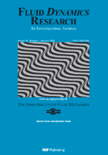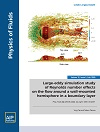
Fluid Dynamics
Scope & Guideline
Unveiling the science of fluid transfer processes.
Introduction
Aims and Scopes
- Theoretical and Computational Fluid Dynamics:
The journal emphasizes the development and application of theoretical models and computational techniques to analyze fluid behavior in diverse scenarios, including turbulence, shock waves, and multiphase flows. - Experimental Fluid Dynamics:
It includes studies that employ experimental methods to investigate fluid phenomena, providing empirical validation for theoretical models and simulations. - Multiscale and Multiphysics Approaches:
Research that integrates various scales and physical processes, such as thermal, chemical, and biological interactions within fluid systems, is a significant focus area. - Environmental and Geophysical Fluid Dynamics:
The journal addresses fluid dynamics related to environmental processes, such as oceanographic and atmospheric flows, including the effects of climate change on fluid behavior. - Biomedical Applications of Fluid Dynamics:
Research that explores fluid dynamics in biological systems, including blood flow, cellular interactions, and the movement of microorganisms, is also prominently featured. - Energy and Industrial Applications:
Studies that investigate fluid dynamics in energy systems, such as combustion processes, hydraulic fracturing, and flow in industrial equipment, are critical to the journal's scope.
Trending and Emerging
- Turbulence Modeling and Control:
Recent papers have increasingly focused on advanced turbulence modeling techniques and control strategies, reflecting a growing interest in understanding and manipulating turbulent flows in various applications. - Multiphase and Complex Fluid Dynamics:
There is a significant trend towards studying multiphase flows, including liquid-liquid, gas-liquid, and solid-liquid interactions, as well as the dynamics of complex fluids, such as colloids and biological fluids. - Fluid-Structure Interaction (FSI):
Research on fluid-structure interaction is gaining traction, particularly in contexts such as biomedical engineering and aerospace, where the interaction between fluids and structures is critical. - Environmental Fluid Dynamics:
Emerging themes include the study of fluid dynamics in environmental contexts, such as the impacts of climate change on ocean currents and atmospheric flows, emphasizing the need for sustainable solutions. - Data-Driven Approaches and Machine Learning:
The incorporation of data-driven methods and machine learning techniques in fluid dynamics research is on the rise, highlighting the potential for predictive modeling and optimization based on large datasets.
Declining or Waning
- Classical Aerodynamics:
Research focused on traditional aerodynamic studies, particularly those involving low-speed flows and simple geometries, appears to be decreasing as advancements in computational power allow for more complex simulations and explorations of high-speed aerodynamics. - Simplistic Fluid Models:
The reliance on overly simplistic fluid models, such as Newtonian fluids in isolation, has diminished as researchers increasingly adopt more complex models that account for non-Newtonian behaviors and real fluid effects. - Static Fluid Studies:
There is a noticeable reduction in studies focusing solely on static fluid scenarios, with a trend moving towards dynamic and transient fluid behaviors that better represent real-world applications. - Conventional Hydraulic Engineering Approaches:
Interest in traditional hydraulic engineering topics, such as basic pipe flow and channel design, has waned in favor of more integrated approaches that consider environmental impacts and sustainability. - Single-Phase Flow Investigations:
Research centered solely on single-phase flows is declining as the field shifts focus towards multiphase flows and their interactions, reflecting the complexity of real-world fluid systems.
Similar Journals

Journal of the Serbian Society for Computational Mechanics
Innovating the Mechanics of TomorrowJournal of the Serbian Society for Computational Mechanics, published by the Serbian Society for Computational Mechanics, is a vital platform for advancing research and knowledge in the field of computational mechanics. Established in 2012, this journal serves the academic community by providing a forum for innovative studies, methodologies, and applications within computational mechanics, presenting valuable insights for researchers, professionals, and students alike. With an ISSN of 1820-6530 and a ranking of Q4 in Computational Mechanics, it carries an essential influence in the engineering realm, despite its current rank of 71 out of 89. The journal's commitment to scholarly excellence aims to foster collaboration and encourage interdisciplinary research, making it an important resource for those invested in the evolving landscape of computational methodologies. Although the journal currently does not offer Open Access options, it remains dedicated to disseminating knowledge that will resonate within the local and global scientific community.

FLUID DYNAMICS RESEARCH
Advancing the Frontiers of Fluid DynamicsFLUID DYNAMICS RESEARCH, published by IOP Publishing Ltd, is a pivotal journal dedicated to advancing the understanding of fluid dynamics through interdisciplinary research that spans several domains including mechanical engineering and physics. With an ISSN of 0169-5983 and E-ISSN 1873-7005, this journal provides a vital platform for researchers aiming to disseminate new findings and theoretical advancements in fluid flow and transfer processes. As of 2023, FLUID DYNAMICS RESEARCH holds a commendable position within the academic community, ranked Q3 in fluid flow and transfer processes, mechanical engineering, and miscellaneous physics and astronomy categories. The journal showcases a diverse array of articles that not only inspire collaboration among professionals and students but also ensure that theoretical and experimental studies are accessible for further development in the field. Operating from the United Kingdom, the journal offers a unique opportunity for scholars worldwide to contribute to the vibrant community dedicated to understanding the complexities of fluid dynamics, even as it anticipates converging its years of research from 1986 to 2024.

Journal of Mathematical Fluid Mechanics
Advancing Knowledge at the Intersection of Mathematics and Fluid MechanicsThe Journal of Mathematical Fluid Mechanics, published by SPRINGER BASEL AG, is a prestigious academic journal dedicated to the study of fluid dynamics through the lens of mathematics. With its ISSN 1422-6928 and E-ISSN 1422-6952, this journal has firmly established itself in the academic community since its inception in 2004, converging knowledge across various mathematical disciplines until 2024. Recognized in the top Q1 quartile rankings for Applied Mathematics, Computational Mathematics, Condensed Matter Physics, and Mathematical Physics as of 2023, it reflects a strong commitment to high-quality research and innovation. The journal features a variety of research articles, reviews, and theoretical frameworks, serving as an essential resource for researchers, professionals, and students eager to explore the mathematical principles underlying fluid mechanics. While it does not offer open access, the impact of its contributions resonates within interdisciplinary fields, advancing both theoretical insights and practical applications.

EXPERIMENTAL THERMAL AND FLUID SCIENCE
Transforming experimental insights into engineering excellence.EXPERIMENTAL THERMAL AND FLUID SCIENCE is a prestigious academic journal published by Elsevier Science Inc, dedicated to advancing the fields of thermal and fluid sciences. With a strong focus on innovative experimental research, it plays a crucial role in disseminating new knowledge and techniques across multiple domains, including Aerospace Engineering, Chemical Engineering, Fluid Flow and Transfer Processes, Mechanical Engineering, and Nuclear Engineering. Holding a notable impact factor and ranking in the Q1 quartile across these categories since 2023, the journal is recognized for its high-quality contributions, which appeal to a diverse audience of researchers, industry professionals, and students alike. Additionally, with dedicated coverage from its inception in 1988 to projections extending through 2025, EXPERIMENTAL THERMAL AND FLUID SCIENCE provides a vital platform for sharing advancements in experimental techniques and findings that shape the future of engineering and applied sciences.

Experimental and Computational Multiphase Flow
Elevating Standards in Fluid Flow and Transfer ProcessesExperimental and Computational Multiphase Flow, published by SpringerNature, is a prestigious academic journal that critically examines advancements in the field of fluid dynamics, with a specialized focus on multiphase flow phenomena. Since its inception in 2019, the journal has established a remarkable reputation, attaining Q1 status in Fluid Flow and Transfer Processes as well as Mechanical Engineering according to the 2023 category quartiles, reflecting its high impact and relevance in these domains. With Scopus rankings placing it among the top 15 journals in both Chemical Engineering and Nuclear Energy and Engineering, Experimental and Computational Multiphase Flow is an essential resource for researchers, professionals, and students engaged in cutting-edge studies and applications. Although it operates on a subscription model, the journal remains dedicated to disseminating high-quality research and fostering a deeper understanding of complex fluid interactions across various scientific disciplines. By prioritizing innovative methodologies and interdisciplinary collaborations, the journal aims to significantly contribute to the ongoing evolution of multiphase flow research, recognizing its critical importance in engineering and energy sectors.

International Journal of Fluid Mechanics Research
Bridging Theory and Practice in Fluid MechanicsThe International Journal of Fluid Mechanics Research, published by BEGELL HOUSE INC, is a pivotal platform for the dissemination of innovative research within the fields of Mechanical Engineering and Physics. With a focus on the intricate dynamics of fluid behavior, this journal has been a cornerstone of scholarly communication since its inception in 1996, continuing to engage a global audience of researchers and professionals through to 2024. With a respectable Impact Factor reflecting its significant contributions to the disciplines—ranking in Q3 for both Mechanical Engineering and Miscellaneous Physics and Astronomy categories—this journal presents a unique opportunity for authors to share their findings in a peer-reviewed environment. Although it does not currently offer Open Access options, all published articles are carefully curated, ensuring high-quality research is accessible to its readership. As the journal navigates the complexities of fluid mechanics, it fosters an interdisciplinary dialogue, bridging theoretical frameworks with practical applications, thereby enhancing understanding and innovation in related fields.

PHYSICS OF FLUIDS
Advancing the Frontiers of Fluid DynamicsPHYSICS OF FLUIDS is a premier journal published by AIP Publishing that serves as a vital resource for the fluid mechanics community. With an impressive impact factor and a consistent ranking in the Q1 quartile across multiple related disciplines—including Computational Mechanics, Condensed Matter Physics, Fluid Flow and Transfer Processes, Mechanical Engineering, and Mechanics of Materials—this journal is renowned for disseminating high-quality research in the dynamic field of fluid dynamics. Covering a wide range of topics, from fundamental fluid mechanics to advanced computational modeling, PHYSICS OF FLUIDS plays a crucial role in advancing understanding and fostering innovation in both academic and industrial applications. With its strong reputation and significant readership, this journal is essential for researchers, professionals, and students seeking to stay updated on the latest developments in fluid physics.

MECCANICA
Fostering Collaboration in Cutting-edge ResearchMECCANICA, an esteemed journal published by Springer, stands at the forefront of research in the fields of Condensed Matter Physics, Mechanical Engineering, and Mechanics of Materials. Established in 1966 and continuing through 2024, this journal provides a robust platform for the dissemination of innovative research and advancements in these increasingly interconnected domains. With an impressive 2023 ranking placing it in the Q2 category across multiple fields, MECCANICA boasts a Scopus rank of #198 in Mechanical Engineering, #150 in Condensed Matter Physics, and #141 in Mechanics of Materials, highlighting its significance and influence within the scholarly community. The journal aims to foster dialogue among researchers, professionals, and students, facilitating the exchange of cutting-edge ideas and methodologies crucial for overcoming contemporary engineering and physics challenges. Readers can access a wealth of knowledge through its comprehensive articles, and while it does not currently offer open access, the journal remains instrumental in shaping the future of engineering and physical sciences.

Case Studies in Thermal Engineering
Advancing the Frontiers of Thermal Engineering ResearchCase Studies in Thermal Engineering, published by ELSEVIER, stands as a premier platform for innovative research and analysis in the field of thermal engineering since its inception in 2013. With a robust Open Access model, this journal ensures that groundbreaking findings in fluid flow and transfer processes are readily accessible to a global audience, fostering collaboration and knowledge sharing across disciplines. Situated in the United Kingdom, the journal boasts an impressive impact factor, reflecting its status in the first quartile (Q1) for both engineering (miscellaneous) and fluid flow and transfer processes, as noted in the latest Scopus rankings. Researchers and professionals alike recognize its significance, ranking 9th out of 96 in Chemical Engineering and achieving a notable 91st percentile in its category. By publishing high-quality case studies, the journal aims to advance understanding and applications of thermal engineering principles, making it an essential resource for those looking to stay at the forefront of this dynamic field.

Journal of Fluid Science and Technology
Elevating Understanding of Fluid Transfer ProcessesThe Journal of Fluid Science and Technology, published by the Japan Society of Mechanical Engineers, serves as a pivotal platform for the dissemination of cutting-edge research in the fields of fluid mechanics and mechanical engineering. With an ISSN of 1880-5558, this Open Access journal has been dedicated to advancing the understanding of fluid flow and transfer processes since its establishment. As of 2023, it holds a significant position with a Q3 quartile ranking in both Fluid Flow and Transfer Processes and Mechanical Engineering categories. Researchers and practitioners are encouraged to explore the journal’s extensive collection of articles, contributing to the body of knowledge that impacts various practical applications in engineering and technology. The journal, which has established a reputation for quality amidst a competitive landscape, further fosters international collaboration and education by providing unrestricted access to its content. For professionals and students alike, the Journal of Fluid Science and Technology represents an invaluable resource for the latest findings and innovations in fluid dynamics and mechanical systems.